
Olive Marie Osmond is an American singer, actress, television personality, author, and businesswoman. She is known for her girl-next-door image and her decades-long career in many different areas. Her musical career, primarily focused on country music, included a large number of chart singles with four reaching number one on the Billboard Hot Country Songs charts. Her 1973 cover of "Paper Roses," released when she was 14, made her the youngest female act with a number-one country single. Between 1985 and 1986, she also had number-one country singles with "Meet Me in Montana," "There's No Stopping Your Heart,", and "You're Still New to Me." As a television personality, she has been a host of Donny & Marie and on The Talk. Her acting career includes appearances in television films and Broadway musicals; she has also written several books and helped found the Children's Miracle Network.

"Ben" is a song written by Don Black and Walter Scharf for the 1972 film of the same name. It was performed by Lee Montgomery in the film and by Michael Jackson over the closing credits. Jackson's single, recorded for the Motown label in 1972, spent one week at the top of the Billboard Hot 100, making it Jackson's first number one single in the US as a solo artist. Billboard ranked it as the number 20 song for 1972. It also reached number 1 on the ARIA Charts, spending eight weeks at the top spot. The song also later reached a peak of number 7 on the UK Singles Chart. In 2004, the song appeared in The Ultimate Collection.
"Too Young" is a popular song, with music written by Sidney Lippman and lyrics by Sylvia Dee. A recording of the song was released by Nat King Cole in 1951, which reached No. 1 in the United States and became the best-selling song of the year. The song was an early attempt by music labels to appeal to the younger demographics and its success later led to a boom in music that catered to the young. Another successful version was released by Donny Osmond in 1972.
"Why" is a hit song recorded by Frankie Avalon in 1959. It reached No. 1 on the U.S. Billboard Hot 100 chart published on the week of December 28, 1959. It was Avalon's second and final No. 1 hit.
"Young Love" is a popular song, written by Ric Cartey and Carole Joyner, and published in 1956. The original version was recorded by Ric Cartey with the Jiva-Tones on November 24, 1956. Joyner was a high school student when she co-wrote the song with Cartey, her boyfriend at the time. It was released in 1956 by Stars Records as catalog number 539 and one month later by RCA Records as catalog number 47-6751. Cartey's version never charted.

"Puppy Love" is a popular song written by Paul Anka in 1960 for Annette Funicello, a Mouseketeer, on whom he had a crush. Anka's version reached No. 2 on the Billboard Hot 100 behind Percy Faith's "Theme from A Summer Place", No. 4 on the Canadian CHUM Charts, and No. 33 on the UK Singles Chart.

"The Twelfth of Never" is a popular song written in 1956 and first recorded by Johnny Mathis the following year. The title is a popular expression, which is used as the date of a future occurrence that will never come to pass. In the case of the song, "the 12th of Never" is given as the date on which the singer will stop loving his beloved, thus indicating that he will always love them.

"Go Away Little Girl" is a popular song written by Gerry Goffin and Carole King. It was first recorded by Bobby Vee for Liberty Records on March 28, 1962. The lyrics consist of a young man asking a young attractive woman to stay away from him, so that he will not be tempted to betray his steady girlfriend by kissing her. The song is notable for making the American Top 20 three times: for Steve Lawrence in 1963, for The Happenings in 1966, and for Donny Osmond in 1971. It is also the first song, and one of only nine, to reach US number 1 by two different artists. Also notable in each of the solo versions is the similar double-tracked treatment of the singer's voice.
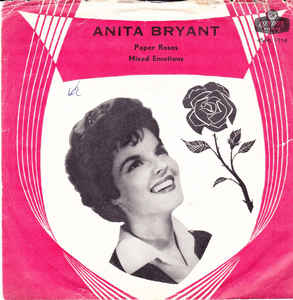
"Paper Roses" is a popular song written and composed by Fred Spielman and Janice Torre. It first was a top five hit in 1960 for Anita Bryant. Marie Osmond recorded it in 1973 and took her version to number one on the US country chart.

The discography of American country pop singer Marie Osmond contains 12 studio albums, three compilation albums, one soundtrack album, 33 singles and 2 album appearances. She first gained exposure on television with her siblings' group, The Osmonds. She then signed her own recording contract with MGM Records. Osmond specifically chose to be marketed towards the country field. In 1973, she released her debut single, "Paper Roses." The song reached number one on the Billboard Hot Country Songs chart and crossed into the top five of the Billboard Hot 100. Her debut studio album of the same name also topped Billboard's country albums chart and spent 20 weeks on the survey. It was also her highest charting album on the Billboard 200 all-genre chart, climbing to number 59. She followed this with 1974's "In My Little Corner of the World" and 1975's "Who's Sorry Now." Both singles reached the top 40 of the Billboard country songs chart. In addition, she released two more studio albums with MGM during this period. She then began a duet career with her brother during the latter half of the 1970s. However, in 1977 she recorded a solo album of pop music entitled This Is the Way That I Feel.

"Hey Girl" is a song written and composed by Gerry Goffin and Carole King. It first became a popular Top ten hit on the Billboard Hot 100 in August 1963 when recorded by Freddie Scott. Donny Osmond took the song back to the Billboard top ten chart with his cover in 1971. Billy Joel recorded a version of the song for his 1997 album Greatest Hits Volume III.
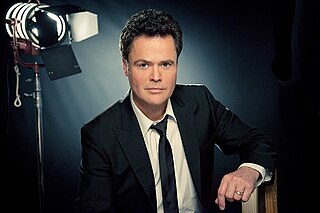
The discography of American pop singer Donny Osmond contains 18 studio albums, nine compilation albums, one live album, four video albums, three extended plays, four music videos, 25 singles, and eight additional appearances. After several years collaborating with his siblings' band, The Osmonds, he embarked on a solo career in 1971. His debut single, "Sweet and Innocent," reached number seven on the Billboard Hot 100 and made him a teen pop star. Its follow-up entitled "Go Away Little Girl" topped the same chart in 1971. Also in 1971 his debut studio album was released called The Donny Osmond Album. It peaked at number 13 on the Billboard 200 all-genre chart. His third studio release, Portrait of Donny, reached number six on the Billboard 200 and is his highest-charting album to date. Its two singles became top ten hits on the pop chart: "Hey Girl" and "Puppy Love." He released his fourth studio effort in 1972, Too Young. The record peaked at number 11 on the Billboard 200. It spawned the top 20 pop hits: the title track and "Why." In 1973, Alone Together marked his fifth studio album release and peaked at number 26 in the United States. It spawned his cover of "The Twelfth of Never," which reached number eight on the Hot 100. By the mid-1970s, Osmond reached adulthood and his career began to decline despite collaborations with his sister, Marie Osmond. In 1976, he recorded an album of disco, which only reached number 145 on the Billboard 200.

To You with Love, Donny is the second studio album by American singer, Donny Osmond, released in 1971. The album reached number 12 on the Billboard Top LPs chart on November 27, 1971. "Go Away Little Girl" was released as a single and it reached No. 1 on the Billboard Hot 100. The album was certified Gold by the RIAA on January 26, 1972.

Too Young is the fourth studio album by American singer Donny Osmond, released in 1972. It reached number 11 on the Billboard Top LPs chart on September 23, 1972. The singles, "Too Young" and "Why", both reached No. 13 on the Billboard Hot 100. It was certified Gold by the RIAA on January 24, 1973.
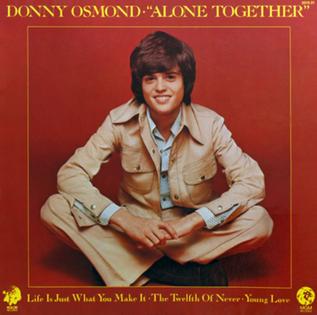
Alone Together is the fifth studio album by American pop singer Donny Osmond, released in 1973. It reached number 26 on the Billboard pop albums chart on May 12, 1973. Two singles were released in support of the album, "The Twelfth of Never" and "Young Love," reaching No. 8 and No. 23 on the Billboard Hot 100 singles chart, respectively. The album was certified Gold in the U.K. on December 1, 1973.
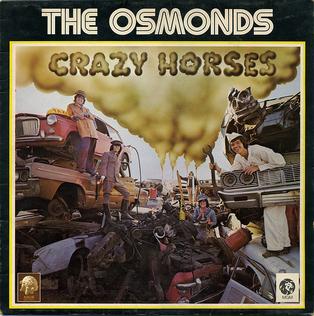
Crazy Horses is the fourth studio album by the American singing group The Osmonds, released in 1972. It entered the Billboard Top LPs chart on October 14, where it reached number 14 on December 23, 1972. Two singles were released in support of the album, "Hold Her Tight" and "Crazy Horses", both of which reached number 14 on the Billboard Hot 100 singles chart. It was certified Gold by the RIAA on January 24, 1973.

My Best to You is a compilation album by American singer Donny Osmond. It contains his hit songs from his first four albums: The Donny Osmond Album, To You with Love, Donny, Portrait of Donny, and Too Young. The album reached number 29 on the Billboard Top LPs chart on February 3, 1973. It was certified Gold by the RIAA on September 14, 1973.
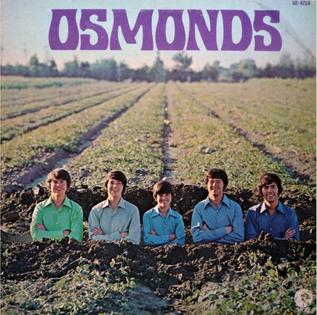
Osmonds is the third album released by the Osmonds, the first under MGM as the Osmonds and the first to feature Donny. The first single from the album, "One Bad Apple", became a number-one hit according to the Billboard Hot 100 singles chart. The second single from the album, "Sweet and Innocent", reached number seven, with the single sleeve crediting group member Donny Osmond as the artist. The album reached number 14 on the Billboard Top Lps chart on February 27, 1971. It was certified Gold by the RIAA on September 13, 1971.
The discography of American music group The Osmond Brothers consists of twenty-eight albums and forty-three singles.

The discography of American pop duo Donny and Marie Osmond contains seven studio albums, four compilation albums, one soundtrack album, one live album and 12 singles. Both siblings had previously had successful solo music careers before first collaborating in 1974; Donny was also a member of his brothers' band, The Osmonds. Their first single, "I'm Leaving It Up to You," reached number four on the Billboard Hot 100. Their corresponding debut album of the same name peaked at number 35 on the Billboard 200 chart in November 1974. The release certified gold in the United States for sales beyond 500,000 copies. Together, the duo had two more hits that reached both the top ten and 20 of the Hot 100: "Deep Purple" and "Morning Side of the Mountain."
















